|
|
|
Sort Order |
|
|
|
Items / Page
|
|
|
|
|
|
|
| Srl | Item |
| 1 |
ID:
153138
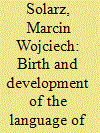

|
|
|
|
|
| Summary/Abstract |
The 1940s saw an intensification of worldwide interest in the problems of development and underdevelopment. One consequence of this was a rapid evolution of the language of global development. The reconstruction of its genesis is most commonly attempted through the analysis of literature on the subject and accounts by those who took part in or observed the debates of the time concerning the world’s development and structure. This article proposes a different approach which locates important events in the evolution of the modern language of global development on timelines tracing populational, political, socio-economic and civilisational processes.
|
|
|
|
|
|
|
|
|
|
|
|
|
|
|
|
| 2 |
ID:
153144
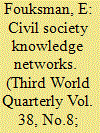

|
|
|
|
|
| Summary/Abstract |
What role have the processes and institutions of international development played in creating and propagating ideas around the world? This paper demonstrates that networks of development-focused civil society institutions can form global epistemic bridges even where communication technology, global markets, infrastructure, or state services do not reach. Given the penetration of these ‘civil society knowledge networks’ throughout the world, it is crucial to understand how these networks form, and how they create and spread ideas, mediating between global discourses and local needs. This paper builds on a multi-sited case study of one such civil society knowledge network, which includes an international foundation, its partner non-governmental organisations (NGOs) in Kenya, and one village where these NGOs run a forest conservation project. The case study provides a closely textured analysis of the mechanisms of knowledge production and consumption in the network, including personality politics, language, technology, political connections and the power dynamics of knowledge flows. It demonstrates the ways remoteness and disconnection are overcome through the epistemic reach of institutional networks involved in development interventions.
|
|
|
|
|
|
|
|
|
|
|
|
|
|
|
|
| 3 |
ID:
153137
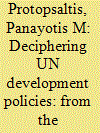

|
|
|
|
|
| Summary/Abstract |
A comparative analysis of the United Nations (UN) resolutions on the development decades reveals an evolution of the UN policies: a gradual shift from the modernisation paradigm to the human development approach, even though the goal of economic growth was never entirely abandoned. Despite this evolution, all relevant resolutions define quantitative targets on inputs and outputs to be met through recommended policy measures involving state intervention in the economy and the society, introduced into developing countries’ plans for development, in accordance with the teachings of the modernisation paradigm.
|
|
|
|
|
|
|
|
|
|
|
|
|
|
|
|
| 4 |
ID:
153143
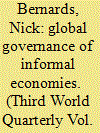

|
|
|
|
|
| Summary/Abstract |
This article develops a Gramscian approach to the governance of ‘informal’ economies through a historical study of International Labour Organization (ILO) programmes in East Africa. Drawing on Gramsci’s conception of the ‘subaltern’, the article highlights the ways in which the articulation of ‘informality’ in policy documents is coloured by broader struggles over the political organisation of labour. The article develops this argument through two case studies. The first examines the World Employment Programme mission to Kenya in the 1970s that popularised the concept of ‘informal’ labour. The second is a contemporary programme on apprenticeships in the informal economy that originated in Tanzania.
|
|
|
|
|
|
|
|
|
|
|
|
|
|
|
|
| 5 |
ID:
153147
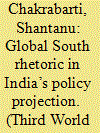

|
|
|
|
|
| Summary/Abstract |
While an on-going statist project tries to portray India as a ‘rising power’ in world politics, the fact remains that India’s global projection continues to be heavily fashioned by the Global South rhetoric. Such rhetoric is inclusive of irredentism and contestation with western norms and ideals along with cooperation leading to a complex process of interactions shaping up the global order. For countries like India being claimant to the status of ‘civilisational state’, the strong urge for autonomy along with the self-perception of national and cultural greatness is shared by the elite along with a sense of strategic importance. Such identity formation, however, reduces and sometimes obliterates the gaps between ‘internal’ and ‘external’, bringing into academic scrutiny the whole range of policymaking and to what extent it matches the state rhetoric.
|
|
|
|
|
|
|
|
|
|
|
|
|
|
|
|
| 6 |
ID:
153148
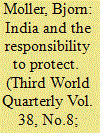

|
|
|
|
|
| Summary/Abstract |
‘Responsibility to protect’ (R2P) is an ‘emerging norm’ of international relations, which has been invoked with the intervention in Libya in 2011. Even though this intervention was demanded by several Third World countries and organisations, these have subsequently had second thoughts about the matter and have come to regard R2P as Western neo-imperialism. This article seeks to explain this apparent paradox, with a special focus on India. It also identifies possible compromises by advocating a broader approach to R2P, stressing the responsibility to prevent and to rebuild. It also draws attention to ‘R2P lite’, including the protection of civilians in armed conflicts.
|
|
|
|
|
|
|
|
|
|
|
|
|
|
|
|
| 7 |
ID:
153146


|
|
|
|
|
| Summary/Abstract |
The main argument of this contribution is that the distinction between internal and external is at best blurred and in reality does not make much sense in the case of India’s foreign policy. It may start and end at the border and be determined by negotiations, diplomacy or brute force but there is no conclusive evidence in the literature to decide what determines what. There are important dynamics and interplays across the thin line between the domestic and international spheres, especially in terms of understanding the reciprocal challenges related to how factors of culture and ethnicity relate with the legitimacy of the state. The aim of the paper is to serve four purposes. To unpack and give a critical overview of the debates concerned with the internal and external aspects of India’s foreign policy; to situate the literature dealing more specifically with domestic issues related to culture and ethnicity and outline the main approaches involved; to give an overview of how external factors impact foreign policy conduct and relate to India’s role in defining international norms and regulations; and, finally, to give some theoretical markers, suggestions and concluding remarks.
|
|
|
|
|
|
|
|
|
|
|
|
|
|
|
|
| 8 |
ID:
153142
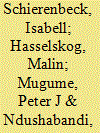

|
|
|
|
|
| Summary/Abstract |
A paradox in current international development cooperation is comprised by the simultaneous insistence on national ownership and far-reaching donor involvement through policy dialogue. In order to better understand this combination of a strong ownership ideal and extensive donor presence, this article explores how national and external actors portray the process of formulating and revising development policies and programmes in an aid recipient country. The study is based on original empirical material from national as well as external actors involved in the aid relation in Rwanda which, despite heavy aid dependence, is known to have achieved relative policy independence. Analysed in relation to three strands of critical thought in previous research, findings show that, in Rwanda, the very top political leadership is actively involved in initiating and formulating policies; that there are instances of negotiation as well as strong disagreements between national and external actors; and that, rather than donors seeking to retain control, Rwanda is depicted as setting its own agenda and effectively managing its donors. The paradox of an ownership ideal combined with donor involvement is thus met by an apparent tendency among national as well as external actors to emphasise national ownership while toning down donor influence.
|
|
|
|
|
|
|
|
|
|
|
|
|
|
|
|
| 9 |
ID:
153145
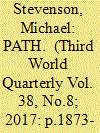

|
|
|
|
|
| Summary/Abstract |
Seattle-based PATH is one of the world’s largest not-for profit organisations focused on improving health in low-income countries. This article argues the history of this understudied organisation is critical to understanding how collective action focused on facilitating developing countries’ access to essential health technologies is structured. Since its establishment almost 40 years ago, the organisation has been a catalyst for multidisciplinary public–private collaboration that has produced affordable, culturally appropriate health technologies. From its origins in reproductive health, enabling contraceptive technology transfers and advising on regulatory standards, to its more recent managerial roles in the development of inexpensive vaccines produced in developing countries, PATH has repeatedly illustrated how public–private collaboration in product research and development can increase poor populations’ access to essential health technologies. This in turn has provided substance to the contested narrative that engaging business is critical to reducing global health disparities.
|
|
|
|
|
|
|
|
|
|
|
|
|
|
|
|
| 10 |
ID:
153141
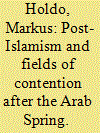

|
|
|
|
|
| Summary/Abstract |
In the aftermath of the Arab Spring, conflicts in Egypt and Tunisia over the authority to rule and the role of religion in society raised questions about these societies’ capacity for reconciling differences. In retrospect, the conflicts also raise questions about the theoretical tools used to analyse regional developments. In particular, the ‘post-Islamism’ thesis has significantly changed the debates on ‘Islam and democracy’ by bringing to light the changing opportunity structures, and changed goals, of Islamist movements. However, this paper argues that the theory underestimates differences within post-Islamist societies. Drawing on field theory, the paper shows how the actual content of post-Islamism is contingent on political struggle. It focuses on three fields whose political roles have been underestimated or misrepresented by post-Islamist theorists: Islamic feminism, Salafist-jihadism and the revolutionary youth. Their respective forms of capital – sources of legitimacy and social recognition – give important clues for understanding the stakes of the conflicts after the Arab Spring.
|
|
|
|
|
|
|
|
|
|
|
|
|
|
|
|
| 11 |
ID:
153139
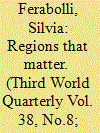

|
|
|
|
|
| Summary/Abstract |
This article critiques interregionalism as a concept that is trapped in the European Union (EU) foreign policy toolkit narrative, which in turn structures what can be said meaningfully and legitimately about interregionalism. Drawing on the experience of the Arab–South American (ASPA) Summit, it shows that, when speaking on interregionalism in International Relations (IR), one need not be speaking about the EU interregional model, which is understood as a vertical relationship established between the EU and an objectified regional partner of its choice. Rather, a broader definition for interregionalism is proposed, one that builds up from the basic ‘region-to-region’ dialogue–arrangement–cooperation and interrogates the meaning it has for those who engage in this practice. This was made possible by the construction of a framework for the analysis of the practices that lead to the materialisation of the ASPA interregional discourse and that reveal how this form of interregionalism in the Global South ‘matters’ in IR.
|
|
|
|
|
|
|
|
|
|
|
|
|
|
|
|
| 12 |
ID:
153140
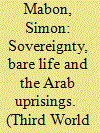

|
|
|
|
|
| Summary/Abstract |
Five years after people took to the streets in protest at political organisation across the Middle East, the consequences of these actions remain. As the protests gained traction, states began to fragment and regimes sought to retain power, whatever the cost. While a great deal of focus has been upon what happened, very little attention has been paid to the role of agency within the context of the fragmenting sovereignty and political change. This article contributes to these debates by applying the work of Giorgio Agamben to the post-Arab Uprisings Middle East, to understand the relationship between rulers and ruled along with the fragmentation of the sovereign state. The article argues for the need to bring agency back into conceptual debates about sovereignty within the Middle East. It concludes by presenting a framework that offers an approach building upon Agamben’s bare life.
|
|
|
|
|
|
|
|
|
|
|
|
|
|
|
|
| 13 |
ID:
153135
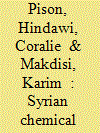

|
|
|
|
|
| Summary/Abstract |
This article explores the successful Syrian chemical weapons disarmament process (2013–2014) within the context of post-Cold War coercive arms control policy and scholarship, particularly related to the Middle East. Based on extensive interviews with individuals involved in the process, we explore the coexistence of two rival, apparently contradictory narratives: one (backed by Western states) claimed coercion was the main contributor to disarmament, while the other (defended by Syrian authorities and Russia) insisted on the process’s consensual features. Our study suggests that the hybrid disarmament framework, embodied in a unique joint mission between the United Nations and the Organisation for the Prohibition of Chemical Weapons, conveniently accommodated both narratives, which in turn contributed to the mission’s success. We then ask whether, with the apparent US retreat in the Middle East, the Syrian case (as well as the 2015 Iran nuclear deal) signals a possible turn in international non-conventional arms control processes that would leave more room for consent and diplomacy.
|
|
|
|
|
|
|
|
|
|
|
|
|
|
|
|
| 14 |
ID:
153136


|
|
|
|
|
| Summary/Abstract |
Just like its recent predecessors, blockchain – also known as the distributed ledger technology – is considered to have the potential to cause major economic, political and social transformations in the Global South. The visible effects of this technology are already being noted there. We present early evidence linking the use of blockchain in overcoming some economic, social and political challenges facing the Global South. The article highlights the key applications and uses of blockchain in developing countries. It demonstrates how blockchain can help promote transparency, build trust and reputation, and enhance efficiency in transactions. The article looks at opportunities and key triggers for blockchain diffusion in these countries. It also delves into challenges and obstacles that developing economies are likely to encounter in the use of blockchain.
|
|
|
|
|
|
|
|
|
|
|
|
|
|
|
|
|
|
|
|
|